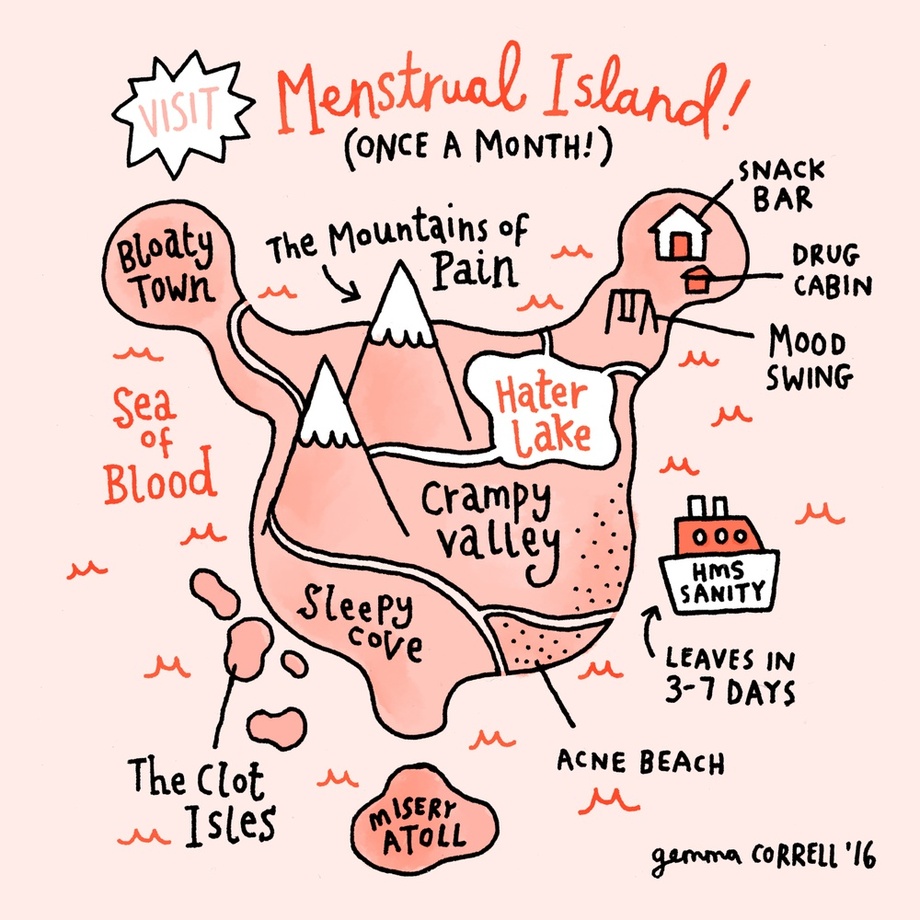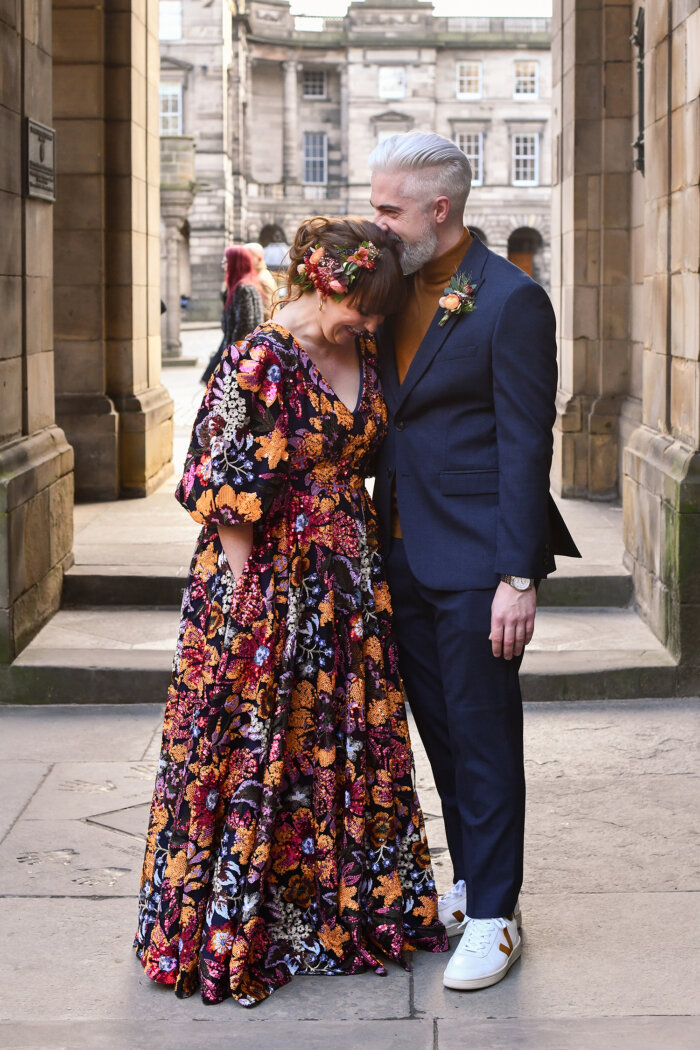Share a bottle of wine with me, and it probably won’t be long before the conversation turns to my current favourite topic: periods. Mooncups, cramps, cervical mucus – nothing’s off limits here. Maybe it’s just me, but I spent the last 15 years rarely discussing the magical, fascinating workings of the female body, and now I feel like I’m making up for lost time.
My friends and I talked a lot about periods when we were entering our teens. We gossiped about who had ‘started’ first, and which one of us might be next. We speculated on what periods might feel like, and shared horrified, whispered stories about girls who had ‘leaked’, or whose sanitary towel had fallen out of her pants during PE.
One by one, my friends did start menstruating, and gained entry to what seemed to me like the secret, adults-only club that was ‘womanhood’. As if they were now too grown up to speak of such things, I never received any of the gory details of what periods were really like until, finally, it was time for me to find out for myself. Horrified but accepting, I didn’t talk about it much either. It just seemed to be a burden we bore in silence, white-faced and sweating on a stool in the science lab, rocking gently with cramps, or fainting at the bus stop.
It’s scary how little we were taught about periods. Most of us remember the awkward school assembly where girls and boys were separated and girls were shown a sanitary towel and a baffling diagram of the uterus. (Still don’t know what the boys were taught!) Perhaps your school did it better? But I can’t say that I learned anything useful that day – certainly nothing about how to manage your period, or what’s normal and what isn’t. Not surprising, then, that some of my friends suffered for years with agonising cramps and heavy periods, having them brushed off by doctors as ‘normal’, only to be diagnosed with endometriosis or PCOS in their 20s and 30s.

With the exception of the briefest mention of tummy aches or asking to borrow a tampon, I didn’t talk to anyone about my periods, nor did I really think about them. It seems strange to me now, that something so integral to my life, and to those of so many other women, something that so many of us share and which should bond us, isn’t often discussed.
Why not?
If you had asked me if I was ashamed of my period, I would have been indignant. Of course a natural bodily function wasn’t anything to be ashamed of! But I certainly acted like I was. Sanitary towels were secreted in a special pouch so that nobody could tell I had one in my schoolbag. Going to the toilet to change a tampon, I would carry the fresh one up my sleeve lest it offended the eyes of a passing male. Despite living with my dad and brother, I don’t believe I ever mentioned the word ‘period’ to either of them growing up. I know women whose partners are so horrified by the mere concept of periods that they won’t let them leave a pack of tampons on the bathroom shelf.
Advertising helped to solidify this sense that periods were something distasteful that should not be discussed. Most commercials spoke about periods only in euphemisms and demonstrated their product’s exceptional absorbability with a mysterious blue liquid – heaven forbid any mention of blood! And who else remembers that nauseating Tampax advert in which the girl is horrified when her boyfriend mistakenly picks up a tampon, thinking, quite reasonably given its bland pastel packaging, that it’s a sweetie? Because boys CANNOT KNOW our shameful secret, right?
Like many teenage girls, I soon dealt with my unpleasant and inconvenient periods by going on the pill and staying on it for the next decade. Gradually over that time, my periods dwindled away almost to nothing. They were pain free and regular as clockwork thanks to my daily dose of estrogen and progesterone, and I didn’t give them a second thought. When I neared my thirties, however, I began to feel less enamoured of the pill. Rightly or wrongly, I started to feel concerned about the long-term consequences of taking artificial hormones for so long. More specifically, I started to wonder how I might feel without them. I wanted to know my body.
When I first came off the pill, my periods were extremely irregular. This did not surprise me. I viewed my body and its workings, then, with no understanding and deep suspicion, thinking of it as an uncontrollable, hormonal, wild animal thing, prone to upset me by bleeding at will, growing hairs where they were not wanted, and almost certainly harbouring the seeds of some kind of mortal disease that may or may not kill me at any given moment.
My body confused and frightened me. There seemed to be no order to it, and I was totally disconnected from it, living entirely in my head and thinking of my body only when I was judging it in front of a mirror, or googling an alarming new symptom would that almost certainly lead to my premature death. I did not feel comfortable in my own skin. I didn’t know a thing about my body or how it worked and I had no faith in it to work as it should. With no particular evidence, I was convinced that when the time came to try for a baby, I would find myself infertile.
After a few months hormone-free, my periods did not return to the 28 day cycle that I had been led to believe was ‘normal’. I knew, though, that going to the doctor’s would only result in the suggestion that I went back on the pill, as this seemed to be the only ‘treatment’ for irregular periods. Masking the symptoms with synthetic hormones didn’t seem like much of a treatment to me. So I decided to take matters into my own hands, and I started to learn about my own body.
The first thing I did was to start tracking my periods and related symptoms using an app, and slowly, things began to make sense. One early discovery was that most period-tracking and fertility apps ask you to monitor and record your cervical mucus.
Now I’m not convinced I had ever head the term ‘cervical mucus’ before, but it certainly sounded embarassing and disgusting and something that a nice, well-brought up lady definitely should not have. Of course I had noticed that sometimes there was some white stuff in my pants, but when I was about 12 I asked my mum if this was normal or a sign of my impending death (I was always an anxious child!) and, reassured that it was in fact normal, I proceeded to never think about it again. Bizarre social media trends like the ‘Clean Panty Challenge’ (google it if you want to be enraged) where women post photos of their spotless undies after a day’s wear, confirmed that cervical mucus was indeed dirty and unmentionable.
Researching it, however, I was genuinely amazed to find that not only was cervical mucus completely normal and healthy, but that you could actually monitor your fertile days simply by noticing how its colour and consistency changed throughout your cycle. Thinking back, I had noticed that sometimes it varied, but I had never noticed any kind of pattern or taken a moment to wonder why it might change – I simply assumed that it was my crazy old body being weird just like usual. I had no idea that this was actually my body doing exactly what it was supposed to do. It’s embarrassing to admit now, but on the other hand, how would I have known? I wasn’t taught it at school, and it was certainly something I would never have dared to mention to my friends. And if the ‘Clean Panty Challenge’ tells us anything, it’s that a very large percentage of the female population are as ignorant about their own bodies as I was.
As usual, I turned to books to solve all my problems. I delved into the huge and fascinating ‘Women’s Bodies, Women’s Wisdom’ by Christiane Northrup, and Lara Briden’s ‘Period Repair Manual’ taught me everything that my school assembly on periods had missed. In ‘Taking Charge of Your Fertility’ by Toni Weschler, I learned about the natural contraception method – how to study my body closely, monitoring not just my cervical mucus but also changes in my basal body temperature, to work out when I am ovulating. This is the same theory behind the app Natural Cycles – the only app which is a certified method of contraception – just a DIY approach involving logging your daily temperature and symptoms on a chart rather than in an app.
I had never paid so much attention to my body before, and it was fascinating and liberating. This attention began to pay off as I developed a deeper understanding about how my body worked. Recently, around the time I expected to ovulate, I had a really stressful couple of days. Knowing that stress can inhibit ovulation, as your body understandably thinks that this is not the right time to have a baby, I thought to myself – I’ll be ovulating late this month, so my period will be a bit later. Fast-forward a couple of days, when I was feeling calmer, I noticed ovulation symptoms, and voila, my period arrived a few days later than would have been expected. Having predicted this, I was not at all alarmed by the delay, and I was amazed that I had come to know my body so well.
Another intriguing read was ‘Flo Living’ by Alissa Vitti. Alissa claims that to obtain optimal health and fertility, as well as regular, painless periods, women should eat certain things during certain points in their cycle, in order to support the body’s needs at this specific time, and make changes to their diets in order to ensure the stable blood sugar that the menstrual cycle needs to work correctly.
As a somewhat skeptical person, I’m not sure whether these claims are truly backed up by science, but I can’t see that making changes like eating larger breakfasts and stocking up on extra root vegetables during my luteal phase will do me any harm, so I’ve been giving it a try. Regardless of whether or not it works, there is something very satisfying and right about feeling more in tune with my body and my cycle and trying to support that in my daily life.
Getting to know my body and supporting it to work to its full potential is a journey I am still on, but it’s a fascinating, liberating and rewarding one.
There is still so much that I don’t know, and that even doctors don’t seem to – the lack of research into diseases like endometriosis makes my blood boil and is a topic for another post. Even so, I actually find it quite magical to observe my body cycling through the myriad functions that enable me to live, thrive, and maybe one day, reproduce. I feel lighter and more comfortable in my own skin, and I am proud of my miraculous female body. I’ve also found that most of my friends have welcomed the opportunity to share their experiences, knowledge and hilarious Mooncup anecdotes as we bond over tales of menstruation nightmares and a glass or two of wine. Why don’t you join us?



